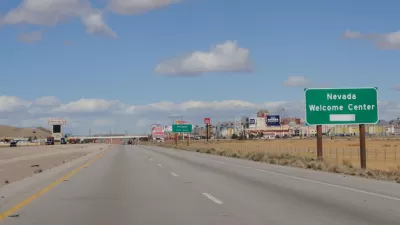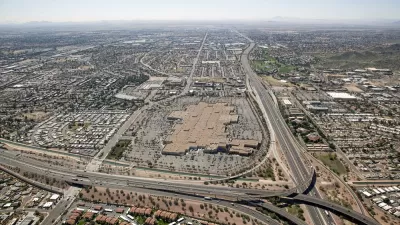WSJ editorial write Allysia Finley opines on the out-migration of working class Californians in search of employment and lower housing costs, contrasting it with in-migration of the same class of Americans during the Depression - also on video.

Finley's piece is based on recent findings from the U.S. Census American Community Survey that show who is leaving the Golden State, and who is not. Similar findings were reported here based on reports from San-Francisco based real-estate firm Trulia.
(M)ost of California's outward-bound migrants are low- to middle-income, with relatively little education...Their median household income is about $40,000—two-thirds of the statewide median—and about 95% earn less than $80,000.
But contrary to conservative lore, there has been no millionaires' march to Texas or other states with no income tax. In fact, since 2005 California has experienced a net in-migration of households earning more than $200,000
Finley points the blame squarely on Sacramento lawmakers for the out-migration as one might expect from the Wall Street Journal editorial board.
(I)t is ironic that many of the intended beneficiaries of California's liberal government are running for the state line—and that progressive policies appear to be what's driving them away.
While she rightfully points to restrictive municipal zoning laws for increasing housing costs, she misses the main reason for those laws, attributing them to attempting to control "suburban sprawl". Finley probably had 'urban growth boundaries' in mind - but far more common is zoning that restricts higher density housing and mixed-used developments that keep property values and rents high, and add to suburban sprawl as opposed to controlling it.
As Harvard public-policy professor Daniel Shoag documents in a working paper, land restrictions became common in high-income enclaves during the 1970s—coinciding with the burgeoning of California's real-estate bubble—and have increased income-based segregation and inequality.
Indeed - "liberal" groups like Public Advocates have taken on restrictive zoning and growth control ordinances in those "high income enclaves" such as Pleasanton and Menlo Park in an effort to increase the supply of affordable housing.
Finley points to the attractiveness of Houston's low housing values - lower than Fresno's - but unlike that city's nearly 15% unemployment rate, Houston's rate is 6%.
Editor's Note: For another counterargument to Finley's claims see Ed Kilgore's post in Washington Monthly.
FULL STORY: Opinion: The Reverse-Joads of California Low- and middle-income residents are fleeing the state.

Maui's Vacation Rental Debate Turns Ugly
Verbal attacks, misinformation campaigns and fistfights plague a high-stakes debate to convert thousands of vacation rentals into long-term housing.

Planetizen Federal Action Tracker
A weekly monitor of how Trump’s orders and actions are impacting planners and planning in America.

San Francisco Suspends Traffic Calming Amidst Record Deaths
Citing “a challenging fiscal landscape,” the city will cease the program on the heels of 42 traffic deaths, including 24 pedestrians.

Half of Post-Fire Altadena Home Sales Were to Corporations
Large investors are quietly buying up dozens of properties in Altadena, California, where a devastating wildfire destroyed more than 6,000 homes in January.

Opinion: What San Francisco’s Proposed ‘Family Zoning’ Could Really Mean
Mayor Lurie is using ‘family zoning’ to encourage denser development and upzoning — but could the concept actually foster community and more human-scale public spaces?

Jacksonville Launches First Autonomous Transit Shuttle in US
A fleet of 14 fully autonomous vehicles will serve a 3.5-mile downtown Jacksonville route with 12 stops.
Urban Design for Planners 1: Software Tools
This six-course series explores essential urban design concepts using open source software and equips planners with the tools they need to participate fully in the urban design process.
Planning for Universal Design
Learn the tools for implementing Universal Design in planning regulations.
Gallatin County Department of Planning & Community Development
Heyer Gruel & Associates PA
JM Goldson LLC
City of Camden Redevelopment Agency
City of Astoria
Transportation Research & Education Center (TREC) at Portland State University
Jefferson Parish Government
Camden Redevelopment Agency
City of Claremont




























